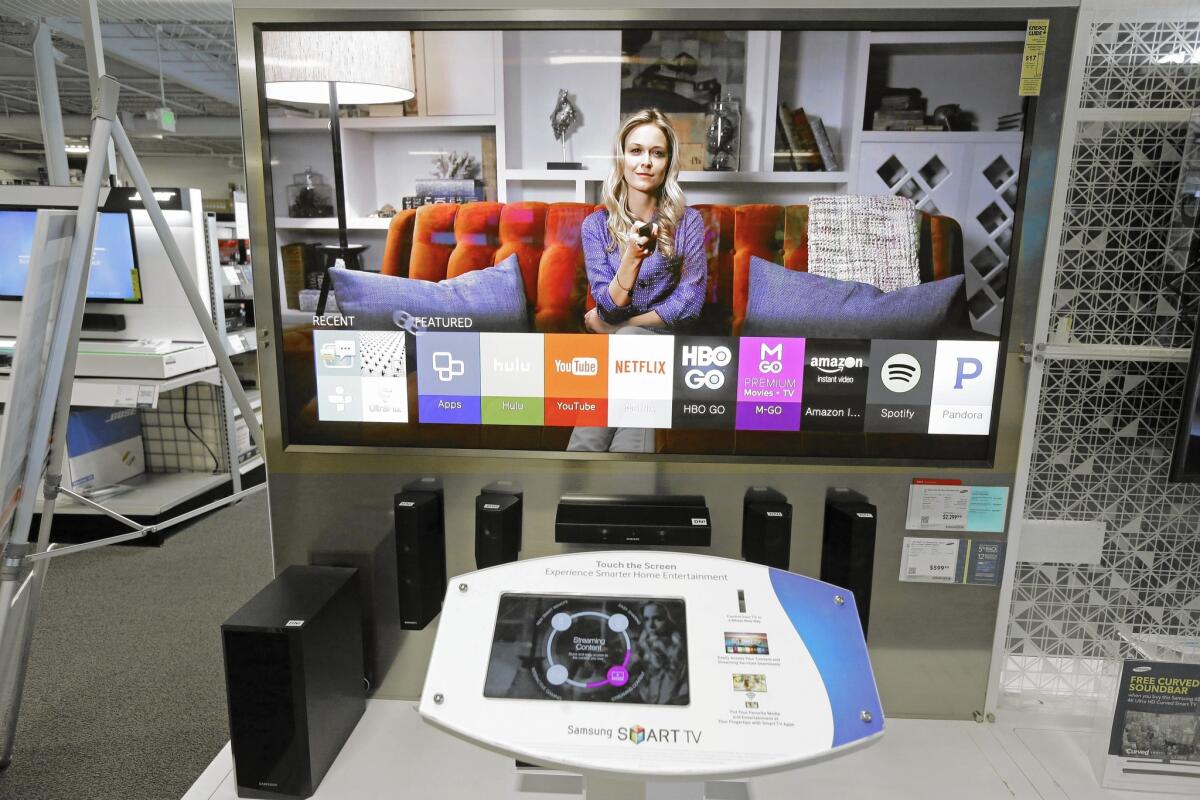When your TV can spy on you.

- Share via
We’ve heard a lot of gee-whiz talk in recent months about “smart homes” and “smart appliances” — promises from the tech industry that Internet-connected devices will make our lives infinitely better and more convenient.
The flip side of all that connectivity, however, is that your wired dwelling will be watching you 24 hours a day, and there’s no telling where this river of data about your private life could end up.
As a result, California is now considering the nation’s first legislation to limit how much one of the most popular smart devices — your TV — can spy on you without your knowing.
“The holy grail of advertisers is to get immediate feedback to an ad,” state Assemblyman Mike Gatto (D-Glendale) told me.
“Imagine if you’re having a Super Bowl party, and an ad comes on and everyone says, ‘Wow, that’s fantastic,’” he said. “The advertiser would want to know that. Or if you’re talking about buying a new shirt, and then you see an ad for a shirt.”
His bill, AB 1116, would require that manufacturers of smart, voice-controlled TVs prominently notify users that their conversations could be electronically overheard and transmitted elsewhere.
It also would slap a strict prohibition on manufacturers and third parties from using or selling stored conversations for advertising purposes.
These would seem like reasonable precautions to most people. But Gatto said tech-industry groups have lobbied aggressively to put the kibosh on his bill, especially the blanket ban on using people’s data for marketing.
“We’ve had to fight every step of the way,” he said.
Gatto’s legislation has passed the Assembly. It’s scheduled to come up for a vote in the state Senate in coming days.
One of the tech world’s great con jobs has been to create the illusion that stuff on the Internet is free. Free email. Free searches. Free get-togethers with others on social media.
Of course, none of this is truly free. The price you pay is your personal information — who you are, where you’re located, what you like and so on.
Read the privacy policy of almost any tech or telecom company. It’ll be a minefield of data tracking and monitoring, and an obstacle course for anyone who wants to try to safeguard his or her privacy.
Last week, the music-streaming service Spotify became the latest tech concern to have to apologize for overreaching in its pursuit of users’ data. The company had released new terms and conditions that included access to people’s pictures and other stuff stored on their smartphones.
Spotify’s chief executive, Daniel Ek, said the company would update its policy.
If anyone needed an example of why it’s troubling to have personal data collected and stored, look no further than last week’s posting of hacked info from Ashley Madison, a website for people who want to cheat on their spouses.
That’s the sort of up-close-and-personal data that Gatto had in mind when he wrote his bill.
He said he learned about a user manual for a Samsung smart TV that blandly mentioned how conversations near the set could be picked up, recorded and shared with others.
“It was like a passage from ‘1984,’” Gatto said. “Imagine the things people might talk about in the privacy of their living room or bedroom. And you wouldn’t know who was listening in.”
I asked Samsung about this. The company responded with a statement acknowledging that its smart TV can receive voice commands and that this feature “can be activated or deactivated by the user.”
“At Samsung, we understand that our success depends on consumers’ trust in us, and the products and services that we provide,” it said. “Protecting our consumers’ privacy is one of our top priorities.”
The company said it supports Gatto’s bill.
My feeling is that the legislation doesn’t go far enough. Any smart appliance in the home is potentially a window on your private life.
Is it convenient being able to control your air conditioner or heater with an iPhone app? Sure it is. Is it kind of cool that your refrigerator can text you if you need to pick up milk on the way home? Totally.
But just as you probably don’t want marketers knowing what websites you visit or what TV shows you watch, you probably don’t want them knowing what you eat, or how often, or what you talk about privately with friends and family.
If or when Gatto gets his bill signed into law, he should look next to a ban on data from all in-home smart appliances being used for advertising purposes. These things are only going to keep getting smarter, after all, and that means more watchful.
Again, none of this tech wizardry is free. Aside from the cost of hardware, the price for these services is intimate knowledge of your behind-closed-doors behavior — so that this information can be used to sell you things.
High-tech conveniences are great. But no one should be placed in the position of being outsmarted by their smart home.
David Lazarus’ column runs Tuesdays and Fridays. He also can be seen daily on KTLA-TV Channel 5 and followed on Twitter @Davidlaz. Send your tips or feedback to david.lazarus@latimes.com.
More to Read
Inside the business of entertainment
The Wide Shot brings you news, analysis and insights on everything from streaming wars to production — and what it all means for the future.
You may occasionally receive promotional content from the Los Angeles Times.











